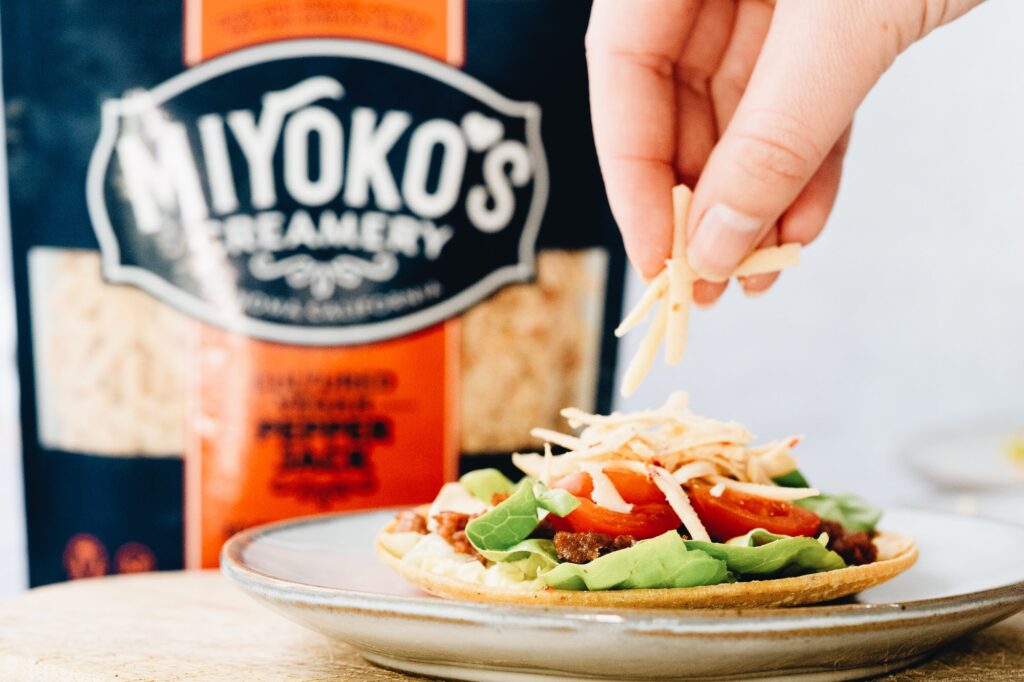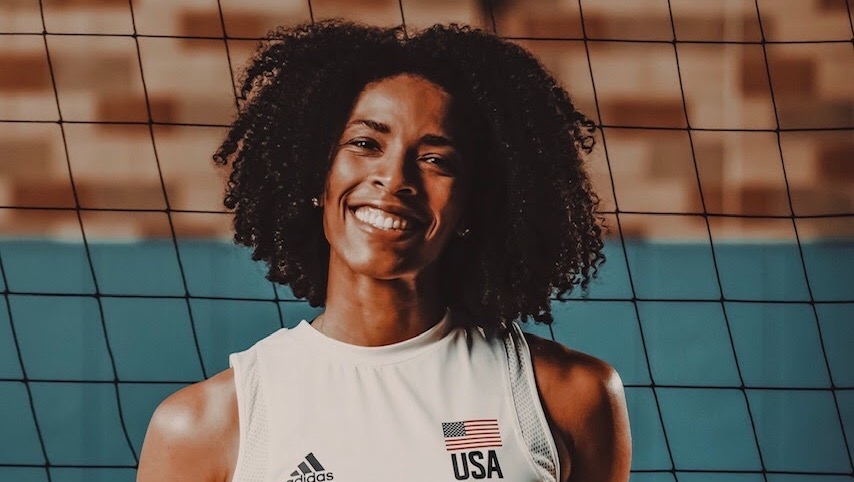Back in 1992, the United States Department of Agriculture (USDA) introduced the food pyramid. It was split into six categories: grains, fruits, vegetables, protein, fats, oils & sweets, and dairy. The story was similar in many other countries; animal-derived dairy products were promoted as healthy additions to a balanced diet. Famous campaigns, like Milk Does a Body Good and Got Milk? sold the idea that dairy products are not only good, but also necessary.
It’s a message that professional volleyball player Rachael Adams, an Olympic Bronze medalist for Team USA who’s training for Tokyo 2021, internalized when she was younger. “It’s so ingrained,” she tells LIVEKINDLY. “In humans, in general, but especially athletes. You grow up seeing all of these athletes in Got Milk? commercials, you think: ‘you drink milk and you get strong bones. You have to have milk to perform.’”
But Adams has since flipped the script on that narrative. She’s now passionately dairy-free, and she’s at the top of her athletic game.
For her, the reality is, milk doesn’t do a body good. For years, she suffered with bloating, gas, nausea, and acne, problems that she now puts down to the amount of dairy she used to eat.
“When I think of dairy, especially in the African American community, it’s just not doing our bodies well. At all,” she says. “So many times I know when I was growing up I would have milk and then get sick, and I was like ‘ok whatever, I know if I’m gonna have this I’m just gonna feel sick.’ We just have been conditioned for it to be normal. It’s not normal.”

Dairy-Free For Health
All bodies are unique and react to different foods in different ways, but there is growing evidence to suggest that Adams’ experience with dairy products is not abnormal. Cheese, in particular, is no longer recommended by a number of dieticians and nutritionists.
Sahra Pak, MS, RD, CPT, DipACLM — co-creator of a lifestyle medicine intervention program in the U.S. Air Force and nutrition advisor for the Plant Based Foods Association — is a firm believer that dairy does most people more harm than good.
She tells LIVEKINDLY: “There are a few negative health impacts that dairy cheese contributes to.”
Cheese is the number-one source of saturated fat in the Standard American Diet, for example. Eating too much saturated fat can raise your cholesterol, which can lead to a greater risk of heart disease (pre-COVID times, heart disease was the leading killer in the U.S.).
Pak adds that casein, the protein in cow’s milk, may trigger migraines, arthritis, and respiratory symptoms for some people. This association is outlined in Dr. Neal Barnard’s book The Cheese Trap, which states that cheese may be mildly addictive because of casein. (You can find out more on the cheese addiction theory here.)
She also points out that a significant benefit of switching to dairy-free cheese, and other plant-based products, is clearer skin, as it reduces the risk of developing acne and eczema.
“In a recent study of nearly 25,000 French adults found that a diet rich in animal products like dairy and fatty and sugary foods was associated with acne in adults,” she explains. “Also, (although it is a small study), whey in dairy has been associated with some young athletes to worsen their acne flare ups.”
On the subject of acne, Adams can testify firsthand that removing dairy has a positive impact. She suffered from bad skin for a long time, until she stopped drinking cow’s milk and eating cheese made from it. “I gave it up and my skin cleared up immediately,” she recalls. The transformation prompted her to question the impact that dairy was really having on her whole body.

Dairy-Free, Improved Recovery
Adams found that eating dairy had a negative impact on her athletic performance.
“I remember I would go into games and my stomach would feel bloated, I’d feel a little heavier,” she says. “I would have cheese before the game, and then yogurt in the morning, and obviously gas comes with dairy you know, your body is not processing it. Like who has time to worry about not letting gas go while you’re trying to perform at a high level?”
She adds that, on the whole, aside from no longer having gas worries, she just felt better on the court. And most importantly: her recovery time was faster.
Again, there is scientific evidence to back up this observation, says Pak. “When athletes eat plants and avoid animal-based foods and ingredients, they improve their performance and recovery due to the increase in blood flow, tissue oxygenation, reduced oxidative stress, and less inflammation,” she notes.

Miyoko’s Does an Athlete Good
So you might think that Adams now lives a boring, cheese-free existence for the benefit of her sport. But that couldn’t be further from the truth. She’s a huge fan of organic dairy-free options, like those from California-based Miyoko’s Creamery.
All of Miyoko’s products are made with nutritious plant ingredients like oat milk, cashew milk, legumes, and nuts.
“My favorite is the [organic plant milk] butters, I like to bake and I like to use it to coat the pans,” she says. “I also like it on toast, and I will put it on my pancakes. I also like to make really good grilled cheese with [Miyoko’s plant cheeses]. I have it as a snack, like cheese and crackers.” She even used it to make a vegan version of that viral TikTok feta pasta recipe.
Miyoko’s products are a much healthier addition to a balanced diet, maintains Pak. Especially when it comes to cheese. (Miyoko’s offers a real variety, including Mozzarella, artisan cheese wheels, cream cheese, and Farmhouse Cheddar & Pepper Jack.)
“For example, cheddar cheese made from cow’s milk contains approximately 30 percent daily value of saturated fat,” she explains. “Miyoko’s Cheddar Cheese, which is made from oat milk, not cow’s milk, contains a lower amount of saturated fat (18 percent) which comes mainly from organic coconut oil.”
She adds that unlike cheese, Miyoko’s products, as well as other vegan cheeses, are animal cholesterol-free.
She notes: “Although there have been some controversies surrounding cholesterol in recent days on whether dietary cholesterol affects blood cholesterol, non-industry funded and more recent studies indicate otherwise.” Pak referred to a 2019 JAMA study, which found that cholesterol consumed through diet (eggs, specifically) raised the risk of “heart disease and death.”
“Each 300 mg ‘dose’ of dietary cholesterol was associated with an increased risk for heart disease and death by 17 percent and 18 percent respectively,” she adds.
Cheese of Champs
Adams isn’t the only athlete that loves Miyoko’s. The brand recently partnered with several plant-based athletes for its Cheese of Champs campaign, which aims to “entice, inspire, and empower” cheese-lovers to make the “world-changing” switch to cheese made from dairy-free milk instead of cow’s milk.
Other Olympic athletes involved in Miyoko’s campaign include former soccer player Heather Mitts Feeley, volleyball player Dustin Watten, track and field runner David Verburg, and cyclist Dotsie Bausch.
And they’re not alone in ditching dairy. Seven-time Formula One champion Lewis Hamilton also follows a plant-based diet, as does soccer star Héctor Bellerín, surfing champion Tia Blanco, top Canadian figure skater Meagan Duhamel, Ironman athlete Rich Roll, and NBA star Kyrie Iriving, to name a few.
The proof is in the performance: all of these athletes are at the top of their game, no animal-based dairy required. For anyone thinking about also making the switch for their health, Adams’ advice is it’s ok to take baby steps.
“Try for three weeks, don’t feel like it has to be a huge commitment, and just keep track of how your body is feeling,” she says. “Have dairy-free options like Miyokos, try different recipes for a week, and substitutes. Just give it a short-term trial, you don’t have to dive in and feel like it’s overwhelming, just set that amount of time for yourself and give it a try.”
To find out more about Miyoko’s products, check out the brand’s website here.
This is a sponsored post.


